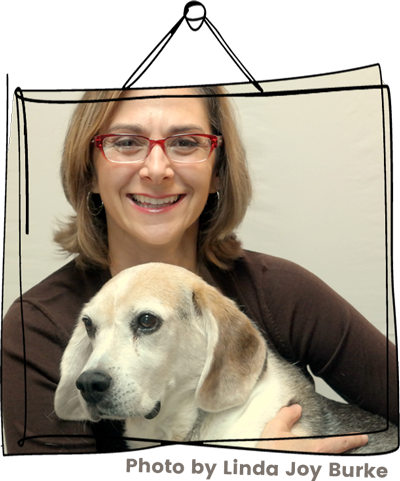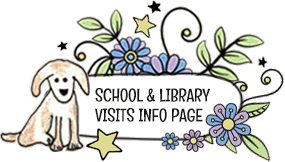
Linda Mitchell is hosting Poetry Friday this week at A Word Edgewise!
I usually keep this blog focused on three things: poetry, children’s books, and arts education. But every now and then, I come across an adult book that begs to be shared.
This week, that book is Griffin’s Heart: Mourning Your Pet with No Apologies, by actor Reagan J. Pasternak.
As most of you know, our lovable Beagle Rudy died unexpectedly last December. The sudden loss hit our family hard and we worried for Rudy’s best friend, our elderly Schnauzer, Sam. Griffin’s Heart is a book I was meant to read.
Reagan’s book includes elements of memoir, covering the disenfranchised grief she felt when her companion animal, a Devon Rex cat, died at age seven. But it also has space for journaling, pockets and pages for photographs, and exercises to help readers sit with their grief.
My favorite writing prompt is: Write a thank you letter to your animal. How beautiful is that? After working through the entire book, the reader has a keepsake to remember their pet by.
Earlier this month, Reagan and I discussed the book over Zoom. It was emotional for both of us, as we talked about Rudy and the dog that Reagan’s family recently said goodbye to.
Since it’s Poetry Friday, you’ll find a companion poem (by Mary Oliver) to read alongside Griffin’s Heart at the end of the post.
Reagan has generously offered a copy of the book to one Poetry Friday reader! Please make a note in your comment that you would like to be part of the drawing for Griffin’s Heart.
5 Questions for Reagan J. Pasternak, author of Griffin’s Heart.
- What did you learn from the process of creating this book?
I started the book more as an outlet for myself. I was searching for the resource that I needed, and I just couldn’t find it. I started writing my experiences down. I’m definitely a storyteller, but I didn’t know what I wanted [the book] to be. One day, my husband just said to me, “You have to finish that book it’s so part of who you are.” It clicked for me. I wanted to tell my story as if I were talking to a friend. It just started flowing together in this way. It’s a friend and it’s a place to pay tribute.
- Why go with an interactive guide and keepsake elements rather than a traditional memoir?
There is this feeling of unresolve when–especially an animal, but–anybody dies, that you’re just supposed to move on. I thought that [readers] know when you close the book, you dedicated time … to have a place [for photos and memories]. They did something good for their animal in working through this book.
- What made Griffin’s personality special?
I wrote down everything I could about him. Because I’d been holding it in. I’d been so afraid to remember him because it hurt so much. And the reality was not remembering him was making it stay in me. He had an adorable smell, like a bean bag. He held my hand when he went to sleep. It was so healing to write down those things.
Griffin was my first adult responsibility. I had to pay the vet bills and make sure I was home in time [to feed him]. He saved me in many ways. He was the constant in my life [as a young adult]. He was a witness to all my ups and downs in those years.
- When a psychiatrist finally acknowledged your grief and showed how it was connected to Griffin, how did you feel?
That was a game changer. I wouldn’t have written the book without that encounter and her in general. It was very, very validating, of course. She listened to me. I told her a little bit about my life and things I’d gone through–almost as if I was on autopilot.
Then when I talked about Griffin is when I actually fell apart. It’s because he was the glue that was holding me together. She understood that me mourning Griffin would help the rest of the areas of my life. That was unbelievable for me and very freeing. That’s when I went home and looked at the photos and started journaling a ton, writing out the memories so I wouldn’t forget them.
- Why is the “no apologies” part of the book’s title important? What’s your response now when someone says an animal who died was “just a pet”?
I felt that I constantly was making disclaimers and apologies and saying, “I know it was just an animal, I’m just really suffering.” That’s disenfranchised grief. I wanted to create a space where you can mourn as hard as you want, and you can take as long as you want. There’s little tips and tricks and coping mechanisms that I learned that I shared.
The idea that mourning is an art is just so beautiful. To not apologize and not question why it’s hurting so much. It’s hurting so much because you loved them so much. There is a bond that forms when you really love an animal.
Reagan J. Pasternak is a Canadian-born film and television actress, singer, and writer. She currently lives in Los Angeles with her husband, son, and five rescue animals. Learn more about Reagan at reaganpasternak.com. Instagram: @reaganjpasternak
I hope you enjoy today’s poem from Mary Oliver’s book, Dog Songs.
LITTLE DOG’S RHAPSODY IN THE NIGHT
By Mary Oliver
He puts his cheek against mine
and makes small, expressive sounds.
And when I’m awake, or awake enough
he turns upside down, his four paws
in the air
and his eyes dark and fervent.
“Tell me you love me,” he says…
Listen to Mary Oliver read the entire poem.
See you next week, everyone. I am looking forward to hosting Poetry Friday!







Thank you for sharing this book. I lost my Bella two years ago. I understand the grief.
I would love to be part of the drawing.
Hi, Sandie. I’m sorry for your loss. We are still mourning for our Beagle, who had an outsized personality to match his physique. Thanks for visiting my blog today.
Thank you so much for this title and the interview and the Mary Oliver sweetness. We had to put our dear, dear Dinah dog down in May. She’s the dog that raised the kids with us and saying good bye seemed impossible. I’ve never cried over a pet like this dog. She was such a best friend that was given to me by my mom who passed away twelve years ago. I could go on and on. I really understand the not wanting to remember because it’s painful line from Reagan. But, I think I will get the book.
Hi, Linda. I knew that this post and this book would speak to people. I’m so sorry about Dinah. Her connection with your family was deep. I wish I had had Reagan’s book when we lost Rudy in December — sometimes we need a container to hold the grief.
It’s been a long time since I’ve had to say goodbye to a pet but more recently I’ve helped my daughter’s family say goodbye to two dear cats, still remembering their dear meows, their unique personalities, even where I would see them when I visited. I remember each dog and cat I’ve ever had, their own special ways & the way their coat felt when petting. “Just a pet” comes from those who haven’t had the close ties I remember. Thanks for sharing this, Laura & Reagan. I imagine many will be so comforted by it.
Hi, Linda. Yes to unique personalities! Reagan advises empathy for those who say, “It’s just a pet,” because they haven’t experienced the love we can have for our animals.
Laura, this was a lovely diversion on your blog today. I loved Reagan’s answers and hearing Mary Oliver read her poem. My daughter is a proud adoptive “mama” of old dogs, so I know someday her heart will break. I’m keeping the title of this book ready to gift to her when needed.
Thank you for visiting, Denise. We also prefer adopting older dogs. Rudy came to us at age 8 (we think) and our new guy, Arthur, is believed to be about 6. I have a special place in my heart for the senior animals!
Truly, there is nothing quite like the relationship we share with our pets. This book will help readers know they are not alone in their grief. Thanks for the poem, too. xo
Hi, Irene. I love that the book is a guide and also a keepsake.
Terrific post, Laura. Thank you, Reagan. Sounds like a bighearted and helpful book!
Thanks for stopping by, Tabatha. I learned so much from this book — like the concept of “disenfranchised grief.”
So much heart in Reagan’s book, thanks for sharing it Laura, and for writing it Reagan. I loved hearing Mary Oliver read her poem too!
Thanks, Michelle!
Laura, thank you for sharing such a tender book for those grieving for their sweet pets. I have not owned a pet nor gone through the loss of one but I understand the grief felt by several of my friends. This book sounds like it is more than just a book. After reading the blurbs about it, I realize this book is a way of easing the pain through memories. What a great interview you provided for all of us.
You’re right! It’s more than a book. What you say fits — this book helps people ease the pain of grieving through their memories.
I wish I’d had this book when my beloved kitty Jennyanydots. She lived a big 20+ year life. Reading about this book makes me realize how much of her I lost by not allowing myself to properly grieve. After her, we’ve had two dogs and a cat who had health problems and weren’t with us long. Our current cat is such a character, and so important to each of us in different ways, that I’ve worried about how we’ll manage when we lose him. I’d love to be entered in the drawing.
Mary Lee, I love that you had a CATS cat. 20 years — wow. I’ll include you in the drawing.
Laura,
Congratulations on your placing in this contest. It was fun to read all the BSFS poems. I love the title of your piece and these last lines that show the real monster in the scene:
“I gave them what they wanted–
a lovesick monster, gentle fiction–
and never saw the creature
lurking in the shadows.”
Thank you for hosting Poetry Friday today.
Oops, sorry, Laura. I posted this on the wrong week. I was having trouble getting my comment to post today. You can delete these two, and I’ll try again on the right post.